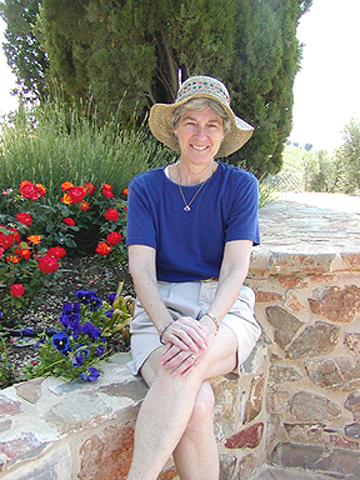
| T H E N I H C A T A L Y S T | S E P T E M B E R – O C T O B E R 2007 |
|
|
|
THE SHINING LEGACY OF ANITA ROBERTS |
by Gail Seabold and Holly Dimitropoulos |
 |
|
Anita
Roberts
|
The Anita B. Roberts Lecture Series was established by the Women Scientist Advisors (WSA) Committee in 2006. The series is dedicated to the memory of Anita Roberts, chief of the Laboratory of Cell Regulation and Carcinogenesis at NCI from 1995 to 2006.
Roberts spent 30 years at NIH, arriving at NCI in 1976 after completing her postdoctoral fellowship at Harvard University. She obtained her Ph.D. in biochemistry from the University of Wisconsin in 1968.
In March 2004, she was diagnosed with aggressive stage IV gastric cancer, which she fought for two years, until her death on May 26, 2006. She documented her thoughts, feelings, and experiences—as a scientist, a family member, and a cancer patient—throughout those two-plus years in her blog:
Roberts as Scientist and Mentor
Anita Roberts was recognized for her combination of excellence as an investigator, mentor, and leader in the scientific community. She received many awards and acknowledgements from her peers, such as the Susan G. Komen Foundation Brinker Award for Distinguished Science, the FASEB Excellence in Science Award, and the Leopold Griffuel Prize.
She was a pioneer in characterizing and showing the significance of transforming growth factor–b (TGF-b) in critical cellular processes such as wound healing and the regulation of cancer, particularly the enhancement of metastasis.
This molecule, to which Roberts devoted her professional life, was later cloned in collaboration with Genentech and expressed in bacteria. The pathway that TGF-b regulates is now considered a target for cancer and rheumatoid arthritis therapies, among others.
From 1983 to 2002, Roberts was one of only three female scientists among the 50 most-cited researchers in the world, compiled by Thomson Scientific’s Science Watch in a feature called "Twenty Years of Citation Superstars."
This honor and achievement speaks for itself in terms of the quality of work she and her laboratory staff produced. Her lab’s productivity was also a testament to the nurturing environment she provided.
NCI’s Michael Sporn, who hired Roberts in 1976 to collaborate with him on vitamin A research, also cited the accomplishments of this brilliant scientist and devoted wife, mother, and, eventually, grandmother as shining testimony that "it is possible for a woman to have a very successful, competitive, cutting-edge career and also have an excellent family life."
Honorees Thus Far
The goal of the Anita B. Roberts Lecture Series is to highlight the research achievements of women scientists in the NIH intramural research program. The first two speakers were Elizabeth Nabel and Elaine Jaffe.
Nabel, NHLBI director and chief of the Vascular Biology and Genomics Section, NHGRI, spoke on "Genomic Medicine and Cardiovascular Disease." Her research focuses on defining pathways that regulate cell growth in the vasculature, remodel the vasculature after injury, and lead to genetic susceptibility to vascular diseases.
Jaffe, chief of the Hematopathology Section and acting chief of the Laboratory of Pathology, NCI, discussed "The Many Guises and Disguises of Follicular Lymphoma." Jaffe is an internationally recognized expert in the classification and differential diagnosis of lymphoma; her work has highlighted the role of the clinical pathologist in the accurate management of these myriad diseases.
The next speaker will be NIDA Director Nora Volkow, whose research shows that blood flow, dopamine levels, and glucose metabolism all change in the brains of chronic drug users—but can return to their predrug state with abstinence.
She explains in the July 16, 2007, issue of Time magazine that "some people have a genetic predisposition to addiction, but because it involves these basic brain functions, everyone will become an addict if sufficiently exposed to drugs or alcohol." Volkow further states that "addiction is a medical condition. We have to recognize that medications can reverse the pathology of the disease. We have to force ourselves to think about a cure [for addiction] because if we don’t, it will never happen."
Please join us on October
23, 2007, at 1:30 p.m, in the Lipsett Amphitheater, Building 10,
for Volkow’s lecture, "Why Is It so Hard for the Addict’s Brain
to Just Say No?" to learn more about addiction and the current progress
that has been made in treating it. Following the lecture, there will be a question-and-answer
session addressing career issues for women in science. ![]()